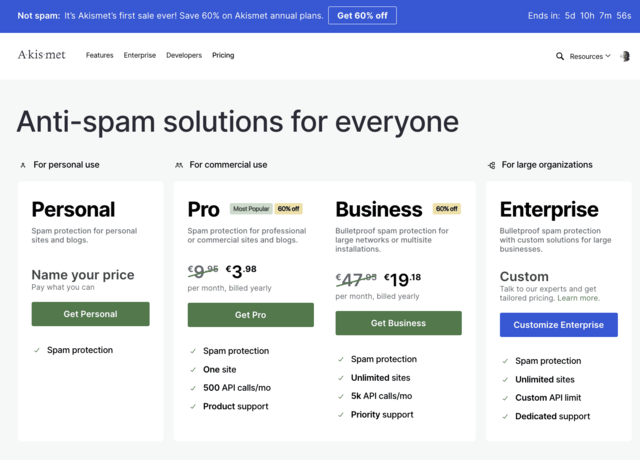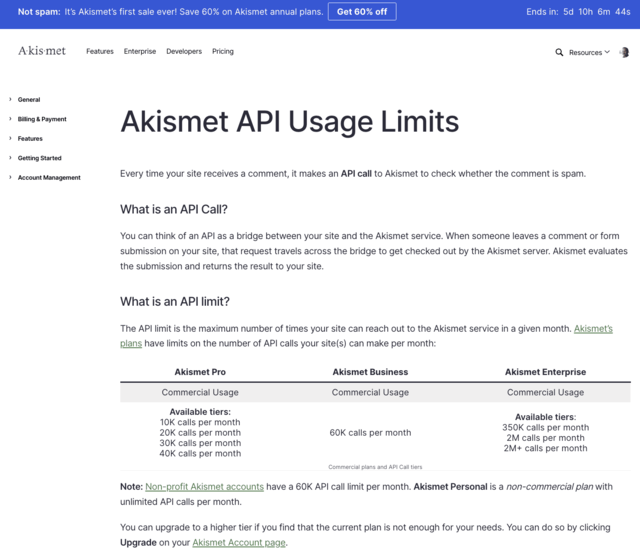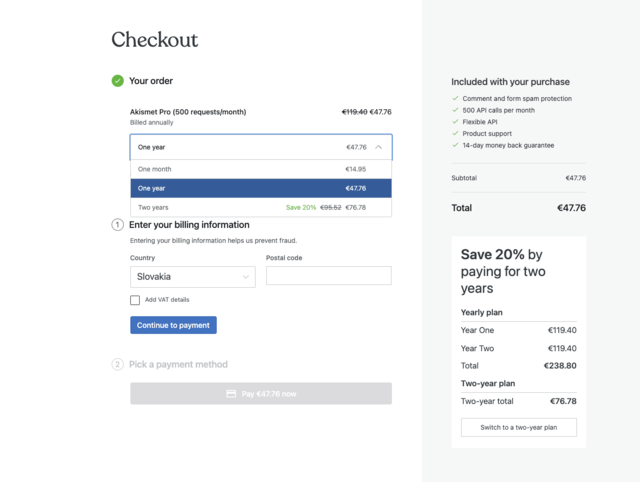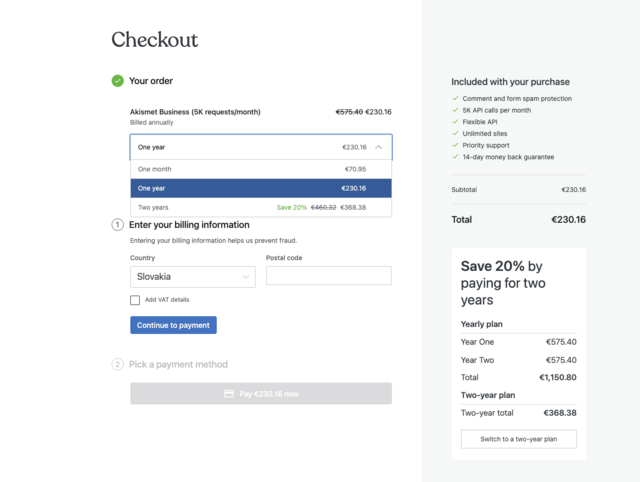Akismet is finally running a sale after 18 years. Hurray, 60% off! Unfortunately, to our dismay, it looks like Automattic has arranged a very nasty bait and switch. Here’s what the normal API tier limits are:
Akismet sale offer
At first glance, the sale offer is very nice.
| Plan | 1 year | 2 year | API calls/ month |
|---|---|---|---|
| Personal | €47 | €77 | 500 |
| Business | €230 | €368 | 5000 |
On the two year plan, this works out to about €3/month for personal (single site) and €15/month for business (multisite). We particularly appreciate a two-year plan with bigger discount as the real costs with software is the set up. Any plan which is one year at discount price and then jumps way up in price is not worth considering. The first year just wastes time and creates lock in for what will ultimately be an expensive service.
However there is a big but in this case. Akismet is not being up front with users.
Here’s what the sale offer includes:

Look closely at the fine print. The API tiers have suddenly become 500 API calls for Pro (single site) and 5000 API calls (multisite) instead of 5000 API calls/single site and 50000 API calls/multisite.
What looks to be the scheme here is to persuade publishers to sign up for the special offer, leave them alone for two or three months (the refund window) and then hammer them with a huge upgrade fee to the normal API limits.
Ethics
What Automattic can then say to its new Akismet subscribers suckers is:
Hey, you signed the contract. We showed you the API limits. Caveat emptor! Be careful next time. But for now you’ll have to pay up or lose access to Akismet for 26 days/month.
How can this be a sale if the API limits are knocked down an order of magnitude (10x)? The answer is you can’t. What Automattic/Akismet is illegal in most jurisdictions. You can’t advertise a sale on a service and then change its parameters at the same time. It’s not a sale any more. In French, they have a word for this kind of behaviour in business, arnaque. The closest English equivalent is con job, or at best, it’s a trick offer.
Usefulness of Black Friday offer
Akismet wants to look at every comment for spam.
Every time your site receives a comment, it makes an API call to Akismet to check whether the comment is spam.
Even a site with almost no traffic gets about 5000 spam comments per month. We’ve written software which makes sure that external spam service API are only queried if it passes basic spam tests. This makes Akismet with its normal low business API limits of 50000 API calls/month useful for a small network of sites. Even with FV Antispam though 500 API calls/month on a single site is not very useful.
Free software to replace Akismet
If you are sick to your stomach looking at this subscription offer and the bait and switch, I understand. Years ago when Akismet first started to play around with weird pricing, we create FV Antispam to limit Akismet API calls. Even now FV Antispam can radically reduce your Akismet API calls by only sending potentially good comments (filtering for obvious spam and not sending those queries to Akismet) to Akismet.
With Thoughtful Comments which allows fast front-end comment moderation and FV Antispam, a publisher can reduce his or her manual spam comment moderation burden to fifty per week on a site which normally receives 20,000 comments/week, of which 3000 are good ones.
This is manageable.
Alternatives
We do include code to query the CleanTalk database for information about email addresses and IP’s. CleanTalk is fairly reliable, it’s affordable and pricing is consistent.
CleanTalk has such a mess of spam and security plugins now that it’s difficult to navigate. The version we use and like are the Blacklists Database and the Email Checker. We spend about $200/year on API credits which covers over a million published comments/year, when used as part of FV Antispam.
We are not assaulting the CleanTalk API with every incoming comment, just the ones FV Antispam is not sure about. FV Antispam filters content and takes into account comment history before sending a comment to an external API for a check.
Conclusion
Automattic/Akismet should improve their ethics and when they put a service on sale it should be the full service and not 1/10th of the service. Akismet should come up with some fair and consistent pricing and not constantly change their business model, driving away long term customers (we were one). Akismet’s original business plan to be a public utility (hundreds of millions of comments processed per month) to help clean up the web was a good one. A small charge per user or at least per commercial user/website made sense.
As soon as Akismet became a datamine and a profit center it loses its value. No publisher wants to spend more on spam, no publisher wants to spend money to hand over data. No publisher wants to put up with a constantly changing business model. No publisher wants a bait and switch offer.
Shame on you Automattic, shame on you Akismet, shame on you Matt Mullenweg.

Alec Kinnear
Alec has been helping businesses succeed online since 2000. Alec is an SEM expert with a background in advertising, as a former Head of Television for Grey Moscow and Senior Television Producer for Bates, Saatchi and Saatchi Russia.



Hi Alec. I found this article research alternaive video players. You give some great insight into the business practices of companies related to Automattic. I never trust any business related to Automattic. I never know what they doing behind the scenes. Their product typically phone home without the users consent. Mind you, they’re not the only ones. I approach softare that is related to Syed Balkhi in the same way. Dodgy business practices seem to be the norm these days. Thanks gain for the good read.
Shane, you are absolutely right about Automattic building telemetry into all their products, i.e. spyware. This should be a no-go for FOSS, but Matt Mullenweg has shown questionable ethics from the very beginning. Automattic’s $2 million acquisition of stolen property (WooCommerce, which was rebranded Prestoshop) from Woo with zero compensation to the original creators opened the floodgates of unethical behaviour in the WordPress plugin market. To wit, plugin acquisition of popular free plugins to mine the users, and turn popular free plugins into vile adware.
Most of the original FOSS developers have long left WordPress over these issues. We soldier on, doing our best to avoid the brigands, scammers and opportunists who have overrun WordPress.